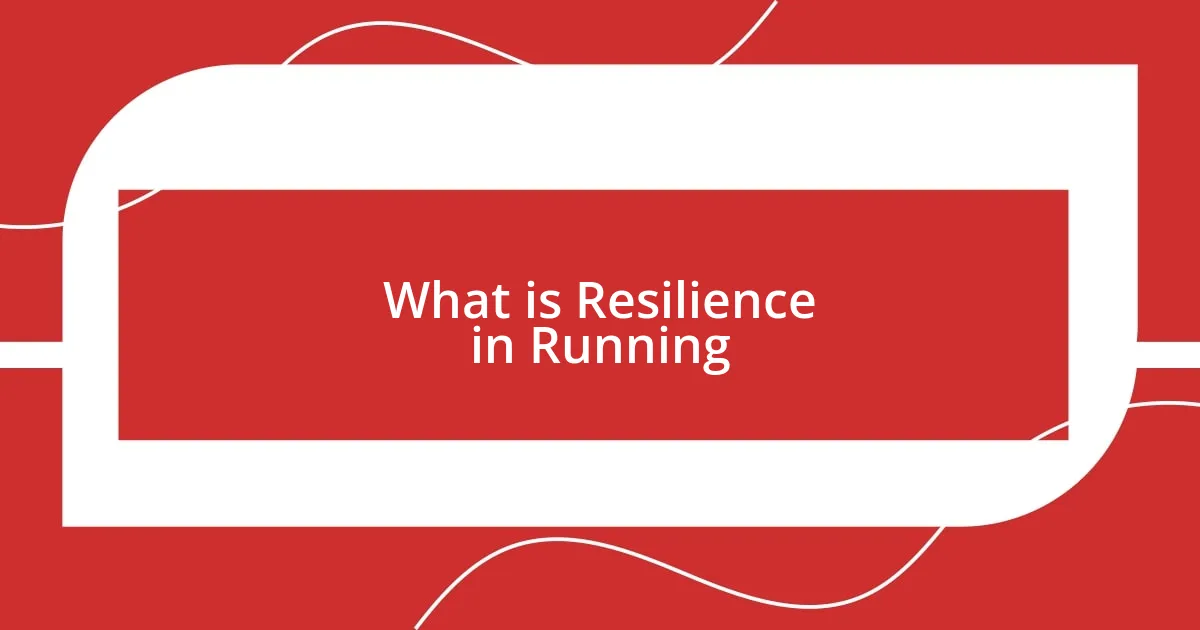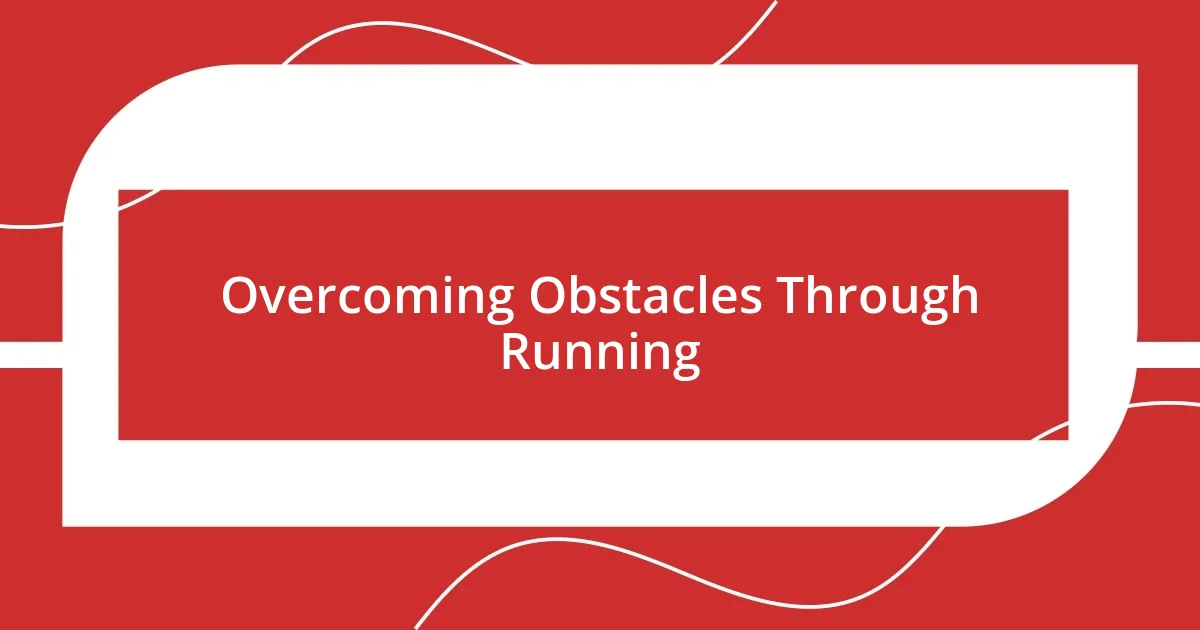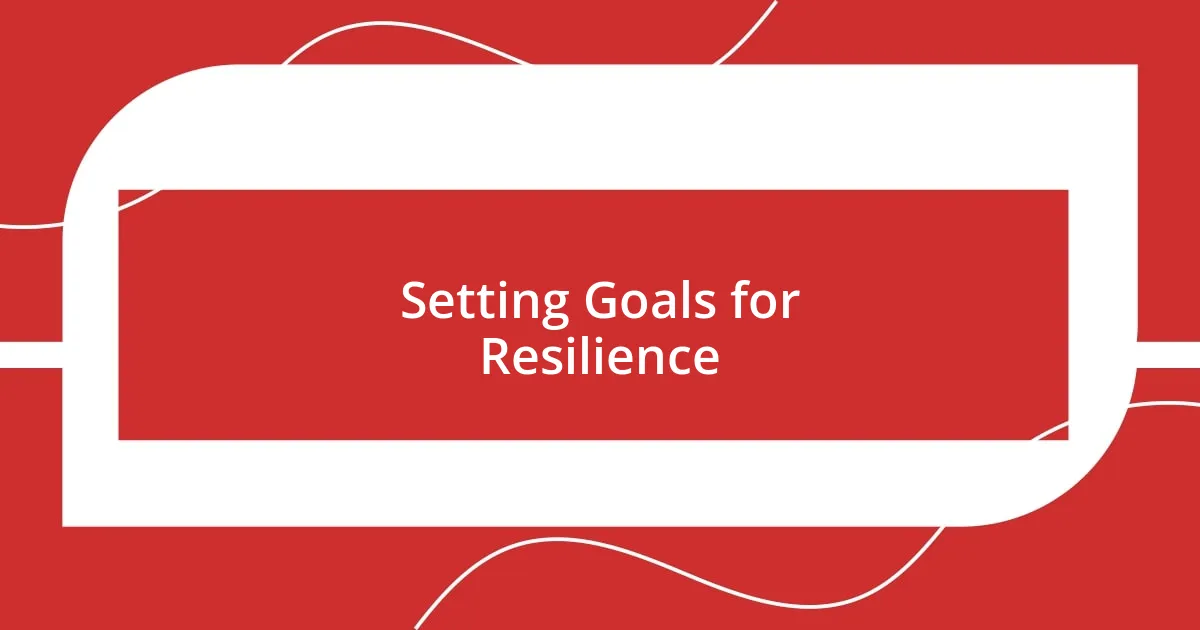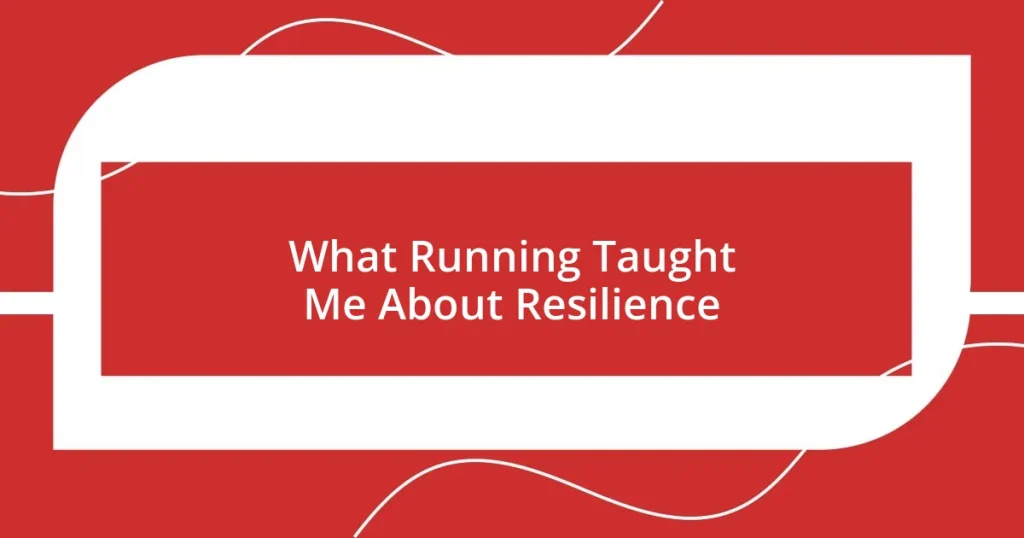Key takeaways:
- Resilience in running is a combination of mental and physical strength, allowing runners to push through discomfort and setbacks.
- Setting incremental goals and tracking progress enhances motivation and builds resilience by embracing the process of growth and learning.
- Community support and shared experiences with fellow runners foster mental strength and encourage perseverance during challenges.
- Failures in running serve as valuable learning opportunities that emphasize the importance of preparation and a positive mindset in achieving personal growth.

What is Resilience in Running
Resilience in running is about more than just finishing a race; it’s the grit to push through discomfort and setbacks. I remember my first marathon; around mile 20, everything hurt. It was a moment where I had to dig deep—what I learned that day was that resilience isn’t just about physical strength; it’s a mental battle, too.
Have you ever faced a wall during your runs? I certainly have. During intense training sessions, I’ve encountered days when my legs felt like lead, yet something in me said, “Keep going.” That’s resilience: the ability to keep moving forward when every fiber of your being begs you to stop. It’s those moments of struggle that shape us and fuel our passion for running.
Ultimately, resilience also means embracing failure and learning from it. There were races I didn’t finish, and it stung like an unexpected rain on a sunny day. Yet, these experiences taught me valuable lessons about pacing, preparation, and perseverance. Each setback became a stepping stone, reinforcing my ability to bounce back and tackle the next challenge even stronger.

The Mental Benefits of Running
Running also provides a remarkable mental clarity that I never expected. Early morning jogs would often turn my overwhelming thoughts into peaceful resolutions. I recall a time when I was grappling with a tough decision—each mile brought with it an epiphany, and by the time I returned home, I was equipped with a fresh perspective. It’s interesting how pounding the pavement can ease mental clutter and lead to breakthroughs.
Moreover, I’ve noticed that the routine of running instills a sense of discipline that spills over into other areas of life. When I commit to a training plan, I learn to prioritize my time and energy effectively. One day, after a particularly grueling week, I found solace in my afternoon run; it became a ritual that grounded me amidst chaos. That consistency, paired with the endorphin boost, reinforces my mental resilience, making me feel empowered and ready to tackle any challenge.
Lastly, the social aspect of running cannot be overlooked. Participating in group runs or races not only fosters a sense of community but also provides motivation during tough times. I remember joining a local running club looking to connect with fellow runners; their support became invaluable during my training. It was comforting to share struggles and triumphs, reinforcing that I wasn’t alone in this journey. These connections nurture mental strength and can be just as essential as the physical training itself.
| Mental Benefits | Examples |
|---|---|
| Clarity of Mind | Running helps me find solutions to problems during my runs. |
| Discipline | Committing to a training plan enhances my time management skills. |
| Community Support | Joining a running club creates bonds that motivate and inspire me. |

How Running Builds Endurance
When I lace up my shoes and hit the pavement, I realize that running is not just a physical pursuit; it’s a powerful way to build endurance, both mentally and physically. Each mile, each heartbeat, and each bead of sweat contributes to my ability to endure longer distances. Like the time I decided to push my limits and train for a half-marathon. As I gradually increased my mileage, not only did my body adapt, but my mind learned to embrace discomfort as part of the journey.
Here are a few key aspects of how running builds that essential endurance:
– Incremental Progress: I gradually increase my distance, which teaches my body to adapt comfortably to longer runs.
– Mental Fortitude: Often, I find myself confronting the urge to stop before reaching my goal, training my mind to persist.
– Crisis Management: During challenging runs, such as when unexpected weather strikes, I learn to stay calm and adapt my strategy on the fly.
– Patience Developing: Endurance isn’t built overnight; it’s the daily commitment that teaches me the value of patience and consistency.
In every run, I often find a dual battle—against the physical barriers of fatigue and the mental barriers of doubt. Just last week, I faced a particularly grueling run when I decided to tackle a hilly route I’d been avoiding. Midway through, every uphill felt like a mountain. Yet, in that moment, I discovered a new reservoir of strength; I pushed through to the end, surprised by my own resilience. The sense of achievement afterward was exhilarating, a reminder that endurance is a muscle that strengthens with every challenge I conquer.

Overcoming Obstacles Through Running
Every runner knows that the road can be as unpredictable as life itself. There was a day, not too long ago, when a nasty storm descended just as I stepped outside. Instead of heading back, I decided to embrace the rain. That run, with water pouring down and gusts of wind pushing me off course, taught me so much about facing obstacles head-on. It’s moments like these that show me resilience isn’t just about power; it’s about adapting and moving forward, regardless of the circumstances.
I remember another instance while training for a local 10K. The course included an insurmountable hill that seemed to mock me with every training run. Initially, I thought of it as an obstacle, but I gradually shifted my mindset. Instead of seeing it as something to dread, I began to view that hill as an essential stepping stone to build my strength and resolve. Each climb not only challenged my legs but fortified my determination. Isn’t it fascinating how we can transform obstacles into opportunities for growth?
With each grueling mile, I often find myself in a dialogue with my inner self. There are times when my legs scream for rest, and self-doubt creeps into my mind, questioning my ability to finish. Yet, in those critical moments, I remind myself that overcoming obstacles is what running is all about. I’ve realized that enduring through those tough stretches translates to resilience in life. Isn’t that what we all want—to show up and push through, regardless of the hurdles we face?

Setting Goals for Resilience
Setting goals is a cornerstone of building resilience in running and life. I vividly remember setting a goal to run a marathon, which felt both exhilarating and intimidating. With each training run, I broke that massive goal into smaller, manageable chunks, like improving my pace for a 5K or extending my long runs by just a mile each week. This method not only kept my motivation high but also taught me that resilience is often about taking one purposeful step at a time.
Tracking progress became a part of my running routine; I noted every mile and how I felt afterward. There was a week when I struggled with an injury and had to adjust my goal. Instead of focusing solely on distance, I concentrated on recovery and strength training, allowing me to redefine what success looked like. Isn’t it incredible how being flexible with your goals can actually enhance your resilience? It reminds me that obstacles, like injuries, can open the door to new strategies and perspectives.
On days when my motivation waned, I often revisited my ultimate goal. I’d ask myself, “Why did I start this journey?” That reflection serves as a powerful reminder of my commitment. For instance, before a big race, I’d visualize crossing that finish line not just as an endpoint but as a culmination of all the small victories along the way. It really brings home the point that resilience isn’t just about enduring a challenge; it’s about embracing the whole process of growth and learning. What personal goals have you set that pushed you beyond your limits?

Lessons from Running Failures
When I think about running failures, one moment stands out vividly. During a particularly tough race, I faltered at the halfway point and had to walk. I felt defeated as I noticed runners passing me by, but that very failure sparked a realization: it’s okay to stumble. Each setback is an opportunity to learn about endurance and patience. So, have you ever felt that crushing disappointment during a challenge? I certainly have, and it taught me that resilience often stems from those very moments of vulnerability.
Another time, I entered a local half-marathon without properly training, thinking my previous runs would carry me through. I quickly learned my lesson when my legs gave out around mile 8. The shame of failing to finish lingered long after that day, but it pushed me to reflect on accountability. I realized I had to embrace the journey, commit to my training, and respect the process. Do you think we sometimes underestimate the importance of preparation? That race certainly taught me that resilience is built through thorough preparation—and it’s a lesson I carry into every new venture.
One experience that particularly resonates with me was when I attempted to set a personal best in a 5K but fell short. Instead of celebrating what I achieved, I was consumed by my disappointment. It was through journaling about that experience that I began to understand the true essence of resilience. It’s about savoring progress and not just the end result. Have you ever been so focused on a single outcome that you missed the broader context? I learned to appreciate the hard work that got me to that race, and from that failure, I emerged with a deeper understanding of growth and perseverance.

Applying Running Lessons to Life
Finding a way to apply lessons from running to everyday life has been transformative for me. For instance, after a race where I faced harsh weather conditions, I learned an invaluable lesson about adaptability. Instead of getting frustrated by the rain and wind, I chose to focus on what I could control—my attitude and effort. Isn’t it interesting how a shift in perspective can turn a challenging situation into a valuable experience? This realization has helped me embrace unpredictability in life and wear it as a badge of honor.
Another aspect of running that carries over to life is the significance of community. I remember joining a local running group as a newbie and feeling both nervous and excited. The support I received was profound; I realized that sharing struggles and triumphs creates resilience. Just like in life, surrounding yourself with a network that encourages you can amplify your strength. Have you ever thought about how collaboration can lighten burdens? This community spirit has taught me that resilience can be a collective effort, not just a solo endeavor.
I often reflect on the mental battles that arise during a long run, especially when fatigue sets in. I recall one particularly grueling 15-mile training run where I felt like giving up around mile 10. Instead of walking, I engaged in positive self-talk to push through. This experience highlighted how overcoming mental obstacles can be just as important as physical ones. Do you ever question your inner dialogue during tough times? Embracing the struggle, whether it’s on the road or in life’s challenges, has shown me that resilience is about nurturing a mindset that celebrates perseverance over perfection.












